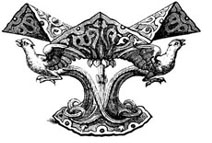
A Tree Grows in St. Louis
REVERT'S ROSTRUM
This tree, like the one Betty Smith describes in her 1943 novel, A Tree Grows in Brooklyn, is not literal but symbolic. The Psalmist writes of the righteous man who is “like a tree planted by streams of water, that yields its fruit in its season, and its leaf does not wither. In all that he does, he prospers” (Ps. 1:3). Indeed, Smith’s “tree” is an allusion to Christ’s comparison of the Kingdom of God with a mustard tree, to which “the birds of the air come and make nests in its branches” (Mt. 13:32). The tree in St. Louis, like that of the Psalmist, yields its fruit in all seasons, and like that of Christ, has nurtured those who have come to rest in its branches. It is the home and lives of Lawrence Feingold and his wife, Marsha, who have blessed a generation of Catholics, especially converts to Catholicism, through their theological and communal ministry.
Dr. Feingold, who teaches theology at Kenrick-Glennon Seminary in St. Louis, is a prodigious scholar, yet he is relatively obscure in comparison to other prominent Catholics who possess far less impressive résumés. I first got wind of him when I was a Calvinist seminarian and began seriously studying Catholicism. A friend who had recently crossed the Tiber recommended him to me. Months later, when I told a Ph.D. candidate in Catholic theology that I was listening to Feingold’s lectures, he responded, “You’re getting just as good an education as I am!” Since then, I’ve been amazed to learn how many people have been catechized by this St. Louis-based theologian. Several Calvinist-to-Catholic converts are among his students, including Bryan Cross, whose writing has graced the pages of the NOR; Barrett Turner, a theology professor at Mount St. Mary’s University in Emmitsburg, Maryland; and Jason Kettinger, a writer for the website Called to Communion, an ecumenical forum that seeks to foster dialogue with Reformed Protestants. Feingold’s ministry to Calvinists seems providential, as St. Louis is home to the seminary of one of the largest Calvinist denominations in the U.S., the Presbyterian Church in America, of which I was once a member.
Feingold’s academic talents are diverse. Among his numerous published works are textbooks on the natural desire to see God, fundamental theology, and the Eucharist. He has also written a three-part series on the mystery of Israel and the Church that examines connections and typology between the two. Scott Hahn praised Feingold’s Faith Comes from What Is Heard: An Introduction to Fundamental Theology (2016) this way: “Every now and then a book comes along that changes everything. Dr. Feingold has produced such a book…. This is the book that will make Fundamental Theology accessible to motivated Catholic laity outside the academy.”
Chapter three alone makes this book worth its weight. It examines the motives of credibility for the Catholic Church, an essential part of our faith that few Catholics know or can effectively articulate, even though it is explained quite early in the Catechism of the Catholic Church (no. 156). Feingold does a fine job in 35 pages of explaining these motives, or “supernatural signs that manifest the miraculous action of God,” which are incredibly important apologetic tools in any conversation explaining and defending our faith.
You May Also Enjoy
The Church can engage in the work of racial reparations, but only while placing the project within a broader moral framework.
Before answering the question, “Why Rome?” I must respond to another: “Why not Takoma Park?” (Takoma Park, Maryland, is the world headquarters of Seventh-Day Adventism.)
In his final days the president requested the ministrations of Fr. Edward Vattmann, and upon his death he was buried with a final blessing by the priest.

